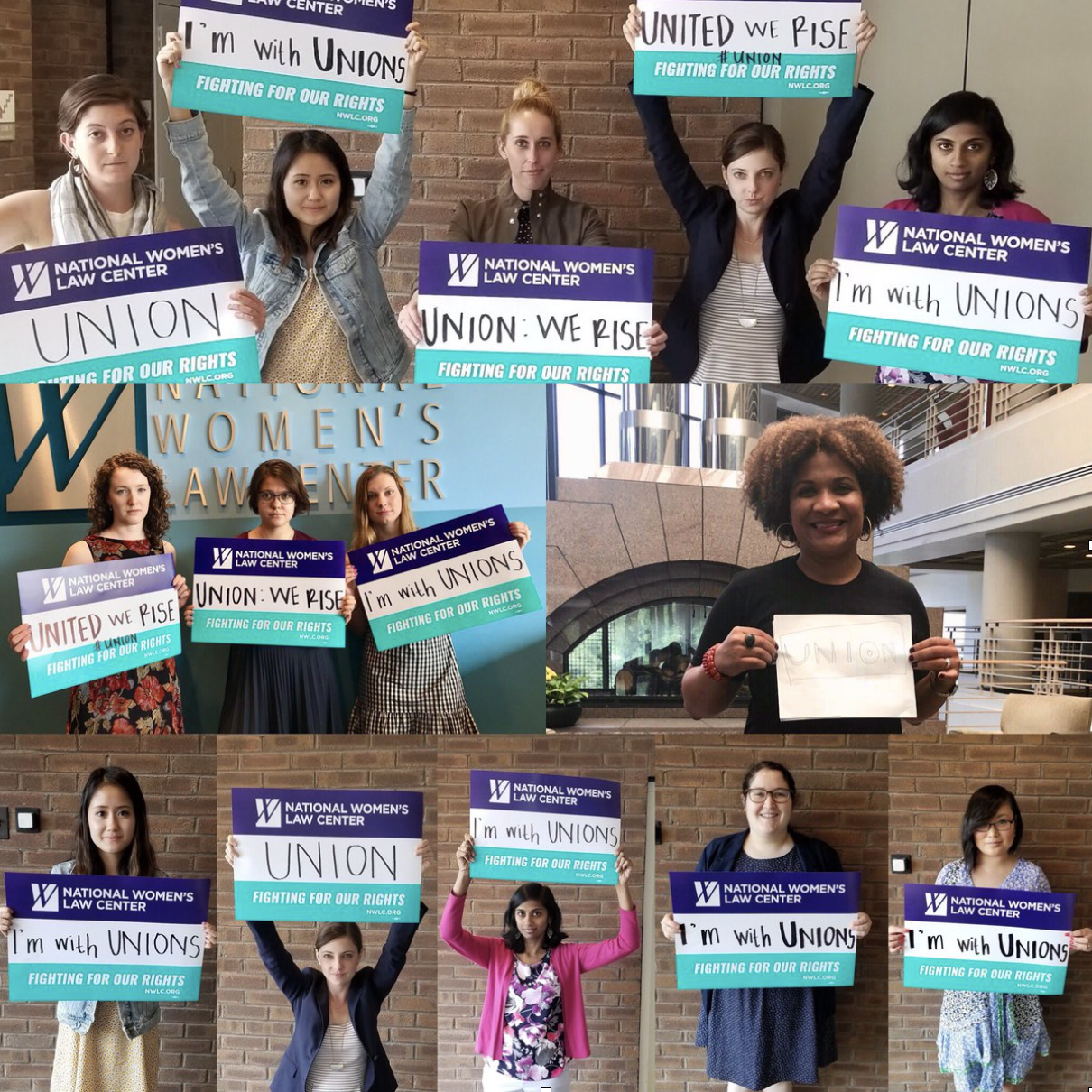New NWLC National Poll and Report Show That Despite Improving Economy, Women Still Lag Far Behind Men
Nearly four in 10 women report their family’s finances are worse than in February 2020
(Washington, D.C.) Today, the National Women’s Law Center (NWLC) released a national quantitative poll and a report, Resilient But Not Recovered, that examine women’s experiences—in and out of the workplace—over the last two years. (Full survey deck is here.) Despite strong recent job growth, NWLC’s analysis and polling reveal that the pandemic’s harsh financial and mental health repercussions continue, especially for women.
More than two-thirds of the net jobs lost since the pandemic began are women’s jobs—and while men have returned to their pre-pandemic labor force size, over 1.1 million fewer women are in the labor force today than in February of 2020. Black women’s unemployment rate (6.1 percent) remains more than a full percentage point higher than it was two years ago. And nearly 40 percent of women—including 66 percent of women who lost or quit a job since February 2020 and 51 percent of women in jobs paying $15/hour or less—say their family’s financial situation is worse today than before the pandemic, compared to 26 percent of men.
The polling and report highlight the caregiving demands that pushed many women out of the workforce and have made it harder for them to return: Among parents who lost or quit a job during the pandemic, only 41 percent of mothers have gotten a new job, compared to 78 percent of fathers. The polling also makes clear that women want policy solutions that improve their ability to return to and thrive at work. For example, 84 percent of women support ensuring access to high-quality child care that costs no more than 7 percent of their family’s income, and nearly nine in 10 women support universal paid family and medical leave.
NWLC commissioned polling firm GQR to conduct the comprehensive survey of 3,800 people from February 7-25, 2022. Additional information about the survey’s methodology follows this release.
The survey’s findings—broken down by gender, race, and ethnicity—feature the experiences of women who are especially likely to face hardship, including Black women, Latinas, and Asian American and Pacific Islander (AAPI) women; women in low-paid jobs (paying $15/hour or less); and women who lost or quit their jobs during the pandemic, many of whom have not returned to the workforce. Women in low-paid jobs were more likely to have lost or quit a job, reduced hours, or changed jobs compared to other women. Nearly half (45 percent) of currently employed women report that they are paid $15 per hour or less, compared to just 23 percent of employed men.
“It should be no surprise that women are emerging from the pandemic in worse economic shape than men,” said Jasmine Tucker, NWLC Director of Research. “Long before the pandemic, millions of women, and especially women of color, were already on the edge of a fiscal cliff—barely living paycheck to paycheck, cobbling together child care, and routinely lacking basic protections like paid leave and health insurance. Today, women are more likely than men to have lost their jobs or left the labor force entirely over the past two years—and more likely to face caregiving demands, inflexible workplaces, and inadequate pay and benefits that can widen wage and wealth gaps and keep women out of the workforce. Two years into the pandemic, ongoing gender and racial disparities threaten a full recovery, and likely will extend its impact well into a third year and beyond.”
“In 2021, I cried every day,” said Teresa Chavez, a 33-year-old Latina mom of two young sons and an essential worker in El Paso, Texas. “I work as an occupational therapist at a hospital clinic, and I worry constantly about getting Covid and bringing it home. Last year, when I was pregnant and working in-person, my stress level was sky-high. On top of everything, my husband and I struggle to pay for child care. We’re running way behind with our expenses, so recently my husband turned in his truck for cash.”
“Over the past year, the American Rescue Plan Act provided essential support for our families and our economy, and helped bring unemployment close to pre-pandemic levels. But we can’t allow a broken pre-pandemic status quo to be our benchmark for recovery,” said Julie Vogtman, NWLC Director of Job Quality. “We can’t accept a return to a ‘normal’ that never worked for millions of women. And we can’t wait one minute longer to put policies in place that will bolster families’ incomes, expand access to health care, and ensure people can care for their loved ones without sacrificing a paycheck. Congress must deliver the policies that women—especially the women of color who have been hardest hit by the COVID-19 crisis—need and demand. The strength and resiliency of our nation’s economy depend on it.”
Additional topline findings from the survey include:
- 58 percent of women overall—including 75 percent of women who lost or quit a job during the pandemic, and 63 percent of women in low-paid jobs—said that the pandemic had a negative impact on their mental health, compared to 45 percent of men overall.
- Only 42 percent of women say they found a new job after losing or quitting a job during the pandemic, compared to 67 percent of men.
- One out of five Latinas lost or quit a job during the pandemic, while 32 percent say they had their hours reduced—more than any other racial or ethnic group.
- Among Black women, 15 percent report losing or quitting a job during the pandemic. Among this group, 59 percent report coming back into the workforce during the pandemic—more than women from any other racial or ethnic group.
- Nearly one in five mothers (19 percent), and more than one in four mothers with children under 5 (26 percent), report that they stop working (or looking for work) when their children are not in school or child care, compared to just 6 percent of fathers and 8 percent of fathers with children under 5.
- The pandemic also impacted family planning decisions, especially for women who are already mothers: More than one in seven mothers (15 percent)—and more than one in five mothers with children under 5 (21 percent)—report that they delayed or abandoned plans to have a child as a result of the pandemic.
- Most women in jobs paying $15 per hour or less (58 percent) report that they do not receive any benefits—i.e., no health insurance, retirement benefits, paid family or medical leave, paid sick days, or paid vacation—through their jobs.
- Majorities of both men and women support a suite of 12 policies designed to improve workplace conditions, support caregiving, and improve access to health care without cost barriers. At least two-thirds of Black, Latina, and AAPI women support all 12 initiatives.
Economic experts at the National Women’s Law Center are available to discuss the recent findings of our national polling and report.
Additional information about the survey:
NWLC commissioned polling firm GQR to conduct a nationally representative mixed mode survey of 3,800 adults from February 7–25, 2022. Half of all interviews were conducted online, while 29 percent were conducted by cell and 21 percent were conducted by landline. Survey data were weighted by age, race, and census region to reflect the U.S. population.
The NWLC/GQR poll includes a nationally representative base of 1,000 adults in the United States, in addition to oversamples of Black women, Latinas, Asian American and Pacific Islander (AAPI) women, women who left the workforce at some point during the pandemic, women in low-paid jobs making $15/hour or less, and state oversamples in Arizona, Georgia, Michigan, and West Virginia. Margin of error on a probability sample of this size for the national base is lower than +/-3 percent. Margin of error for the oversampled groups range from +/-3.3 percent for women who left the workforce to +/-6.1 percent for AAPI women. Margin of error is higher among subgroups.
NWLC also commissioned Sprout Insight to conduct in-depth interviews and focus groups from December 7-13, 2021 with 35 working women between the ages of 25–55 from Arizona, Georgia, Michigan, New Hampshire, Pennsylvania, Virginia, West Virginia, and Wisconsin. Of the 35 women, 22 participated in 20-minute in-depth individual virtual interviews, and the remaining 13 women participated in three 90-minute virtual focus groups. Women varied in racial/ethnic background (i.e., AAPI, Black, Latina, and white), employment situation, and income. Several women’s reflections are quoted in NWLC’s report, Resilient But Not Recovered: After Two Years of the COVID-19 Crisis, Women Are Still Struggling.




